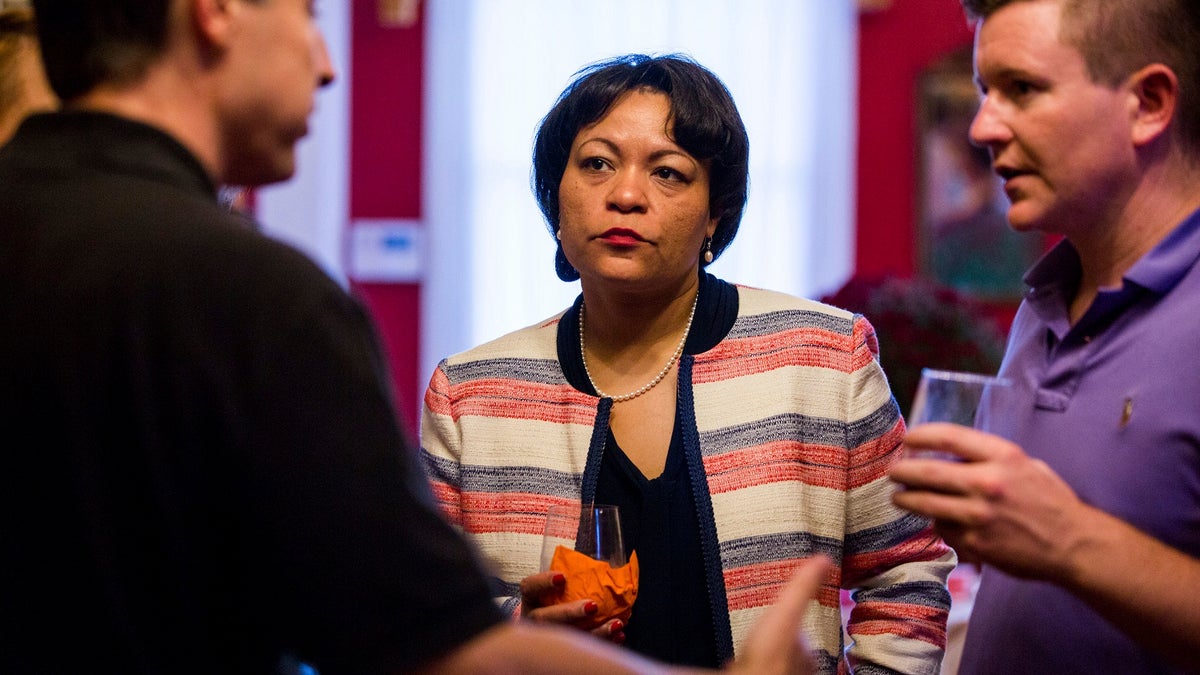
Democrat LaToya Cantrell, center, listens to campaign donors, Sept. 22, 2017. (Sophia Germer/The Advocate via Associated Press)
LaToya Cantrell, a liberal community organizer whose political career began as she helped her storm-ravaged neighborhood recover from Hurricane Katrina, was decisively elected the first woman mayor of New Orleans in a historic win Saturday.
The 45-year-old Democrat, who currently serves on the City Council, will succeed term-limited fellow Democrat Mitch Landrieu as the city celebrates its 300th anniversary next year.
"Almost 300 years, my friends. And New Orleans, we're still making history," Cantrell told a cheering crowd in her victory speech.
Cantrell, who grew up in Los Angeles, also became the first non-native to be elected mayor in New Orleans in recent history -- and perhaps since the city's inception, according to Brian Brox, a political science professor at Tulane University.
She won support from activist groups by pledging to work to raise the local minimum wage to $15 an hour, as well as to support laws guaranteeing equal pay to women and prohibiting employers from asking about applicants' criminal records, the Advocate reported.
But those reforms will be difficult to achieve, because the state legislature prohibits local governments from setting the minimum wage for non-government workers, the Advocate reported.
Nevertheless, Cantrell, who had led in most polls conducted before Saturday, never trailed as votes were counted.
Her opponent, former municipal Judge Desiree Charbonnet, conceded the race and congratulated Cantrell late Saturday. Later, complete returns showed Cantrell with 60 percent of the vote.
"I do not regret one moment of anything about this campaign," Charbonnet said.
The two women led a field of 18 candidates in an October general election to win runoff spots.
Landrieu earned credit for accelerating the recovery from Hurricane Katrina in an administration cited for reduced blight, improvements in the celebrated tourism economy and economic development that included last week's announcement that a digital services company is bringing 2,000 new jobs to the city.
But Cantrell will face lingering problems. Crime is one. Another is dysfunction at the agency overseeing the city's drinking water system and storm drainage — a problem that became evident during serious flash flooding in August.
About 32 percent of the city's voters took part in last month's election. It was unclear whether turnout would surpass that on Saturday.
Cantrell faced questions about her use of a city credit card. Charbonnet had to fight back against critics who cast her as an insider who would steer city work to cronies.
Katrina was a theme in the backstory of both candidates. Cantrell moved to the city from California. Her work as a neighborhood activist in the aftermath of Katrina in the hard-hit Broadmoor neighborhood helped her win a seat on council in 2012.
Charbonnet, from a well-known political family in New Orleans, was the city's elected recorder of mortgages before she was a judge. In the campaign she made a point of saying hers was the first city office to re-open after Katrina, providing critical property records to the displaced.
Cantrell entered the race as the perceived front-runner, leading in fundraising and in various polls.
Former state civil court Judge Michael Bagneris, who finished third in last month's race, endorsed Cantrell, as did Troy Henry, a businessman who also ran for the post last month.
UNO political science professor Edward Chervenak said the endorsements appeared to help Cantrell overcome revelations that she had used her city-issued credit card for thousands of dollars in purchases without clear indications that they were for public purposes. The money was eventually reimbursed but questions lingered about whether she had improperly used city money for personal or campaign expenditures.
The Associated Press contributed to this report.




